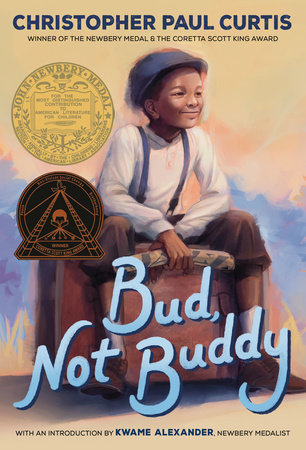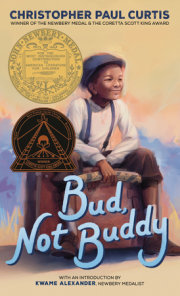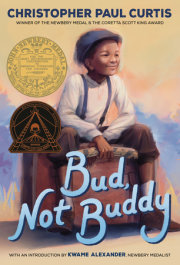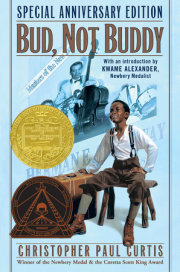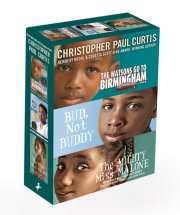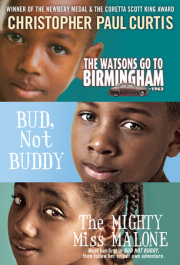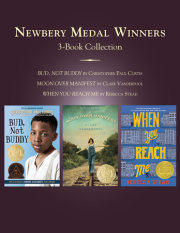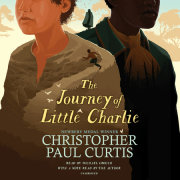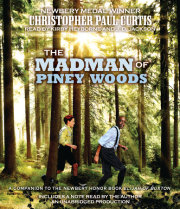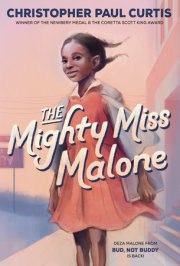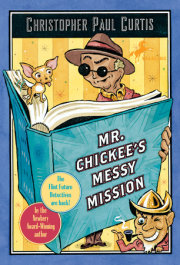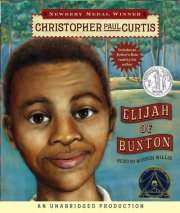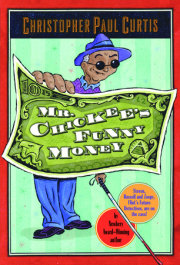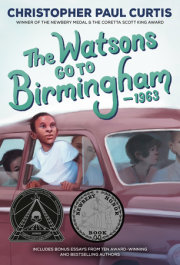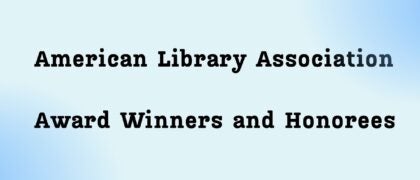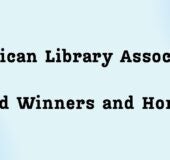CHAPTER 1
Here we go again. We were all standing in line waiting for breakfast when one of the caseworkers came in and tap-tap-tapped down the line. Uh-oh, this meant bad news, either they’d found a foster home for somebody or somebody was about to get paddled. All the kids watched the woman as she moved along the line, her high-heeled shoes sounding like little firecrackers going off on the wooden floor.
Shoot! She stopped at me and said, “Are you Buddy Caldwell?”
I said, “It’s Bud, not Buddy, ma’am.”
She put her hand on my shoulder and took me out of line. Then she pulled Jerry, one of the littler boys, over. “Aren’t you Jerry Clark?” He nodded.
“Boys, good news! Now that the school year has ended, you both have been accepted in new temporary-care homes starting this afternoon!”
Jerry asked the same thing I was thinking. “Together?”
She said, “Why, no. Jerry, you’ll be in a family with three little girls . . .”
Jerry looked like he’d just found out they were going to dip him in a pot of boiling milk.
“. . . and Bud . . .” She looked at some papers she was holding. “Oh, yes, the Amoses, you’ll be with Mr. and Mrs. Amos and their son, who’s twelve years old, that makes him just two years older than you, doesn’t it, Bud?”
“Yes, ma’am.”
She said, “I’m sure you’ll both be very happy.”
Me and Jerry looked at each other.
The woman said, “Now, now, boys, no need to look so glum. I know you don’t understand what it means, but there’s a depression going on all over this country. People can’t find jobs and these are very, very difficult times for everybody. We’ve been lucky enough to find two wonderful families who’ve opened their doors for you. I think it’s best that we show our new foster families that we’re very . . .”
She dragged out the word very, waiting for us to finish her sentence for her.
Jerry said, “Cheerful, helpful and grateful.” I moved my lips and mumbled.
She smiled and said, “Unfortunately, you won’t have time for breakfast. I’ll have a couple of pieces of fruit put in a bag. In the meantime go to the sleep room and strip your beds and gather all of your things.”
Here we go again. I felt like I was walking in my sleep as I followed Jerry back to the room where all the boys’ beds were jim-jammed together. This was the third foster home I was going to and I’m used to packing up and leaving, but it still surprises me that there are always a few seconds, right after they tell you you’ve got to go, when my nose gets all runny and my throat gets all choky and my eyes get all sting-y. But the tears coming out doesn’t happen to me anymore, I don’t know when it first happened, but it seems like my eyes don’t cry no more.
Jerry sat on his bed and I could tell that he was losing the fight not to cry. Tears were popping out of his eyes and slipping down his cheeks.
I sat down next to him and said, “I know being in a house with three girls sounds terrible, Jerry, but it’s a lot better than being with a boy who’s a couple of years older than you. I’m the one who’s going to have problems. A older boy is going to want to fight, but those little girls are going to treat you real good. They’re going to treat you like some kind of special pet or something.”
Jerry said, “You really think so?”
I said, “I’d trade you in a minute. The worst thing that’s going to happen to you is that they’re going to make you play house a lot. They’ll probably make you be the baby and will hug you and do this kind of junk to you.” I tickled Jerry under his chin and said, “Ga-ga goo-goo, baby-waby.”
Jerry couldn’t help but smile. I said, “You’re going to be great.”
Jerry looked like he wasn’t so scared anymore so I went over to my bed and started getting ready.
Even though it was me who was in a lot of trouble I couldn’t help but feel sorry for Jerry. Not only because he was going to have to live around three girls, but also because being six is a real rough age to be at. Most folks think you start to be a real adult when you’re fifteen or sixteen years old, but that’s not true, it really starts when you’re around six.
It’s at six that grown folks don’t think you’re a cute little kid anymore, they talk to you and expect that you understand everything they mean. And you’d best understand too, if you aren’t looking for some real trouble, ’cause it’s around six that grown folks stop giving you little swats and taps and jump clean up to giving you slugs that’ll knock you right down and have you seeing stars in the middle of the day. The first foster home I was in taught me that real quick.
Six is a bad time too ’cause that’s when some real scary things start to happen to your body, it’s around then that your teeth start coming a-loose in your mouth.
You wake up one morning and it seems like your tongue is the first one to notice that something strange is going on, ’cause as soon as you get up there it is pushing and rubbing up against one of your front teeth and I’ll be doggoned if that tooth isn’t the littlest bit wiggly.
At first you think it’s kind of funny, but the tooth keeps getting looser and looser and one day, in the middle of pushing the tooth back and forth and squinching your eyes shut, you pull it clean out. It’s the scariest thing you can think of ’cause you lose control of your tongue at the same time and no matter how hard you try to stop it, it won’t leave the new hole in your mouth alone, it keeps digging around in the spot where that tooth used to be.
You tell some adult about what’s happening but all they do is say it’s normal. You can’t be too sure, though, ’cause it shakes you up a whole lot more than grown folks think it does when perfectly good parts of your body commence to loosening up and falling off of you.
Unless you’re as stupid as a lamppost you’ve got to wonder what’s coming off next, your arm? Your leg? Your neck? Every morning when you wake up it seems a lot of your parts aren’t stuck on as good as they used to be.
Six is real tough. That’s how old I was when I came to live here in the Home. That’s how old I was when Momma died.
I folded the blanket and sheet and set them back on the mattress. Then I reached under the bed to get my suitcase. Most of the kids in the Home keep their things in a paper or cloth sack, but not me. I have my own suitcase.
I set it on the mattress and untied the twine that held it together. I did what I do every night before I go to sleep, I checked to make sure everything was there. The way there’re more and more kids coming into the Home every day, I had to make sure no one had run off with any of my things.
First I pulled my blanket out and saw that everything was where it was supposed to be. At the bottom of my suitcase were the flyers. I took the blue flyer out and looked at it again.
The paper was starting to wear out from me looking at it so much but I liked checking to see if there was anything I hadn’t noticed before. It was like something was telling me there was a message for me on this flyer but I didn’t have the decoder ring to read what it was.
Across the top of the flyer writ in big black letters were the words limited engagement, then in little letters it said, “Direct from an S.R.O. engagement in New York City.” Underneath that in big letters again it said, “herman e. calloway and the Dusky Devastators of the Depression!!!!!!”
Those six exclamation points made it seem like this was the most important news anyone could think of, seems like you’d have to be really great to deserve all of those exclamation points all stacked up in a row like that.
Next the paper said, “Masters of the New Jazz,” then in the middle of the flyer was a blurry picture of the man I have a real good suspicion about. I’ve never met him, but I have a pretty good feeling that this guy must be my father.
In the picture he’s standing next to a giant fiddle that’s taller than him. It looks like it’s real heavy ’cause he’s leaning up against it trying to hold it up. He looks like he’s been doing this for a long time and he must be tired ’cause he has a droopy, dreamy look on his face. There are two men beside him, one playing drums and the other one blowing a horn.
It wasn’t hard to see what the guy who must be my father was like just by looking at his picture. You could tell he was a real quiet, real friendly and smart man, he had one of those kind of faces. Underneath the picture someone had writ with a black fountain pen, “One Night Only in Flint, Michigan, at the Luxurious Fifty Grand on Saturday June 16, 1932. 9 Until ?”
I remember Momma bringing this flyer with her when she came from working one day, I remember because she got very upset when she put it on the supper table and kept looking at it and picking it up and putting it back and moving it around. I was only six then and couldn’t understand why this one got her so upset, she kept four others that were a lot like it in her dressing table, but this one really got her jumpy. The only difference I could see between the blue one and the others was that the others didn’t say anything about Flint on them.
I remember this blue one too ’cause it wasn’t too long after she brought it home that I knocked on Momma’s bedroom door, then found her.
I put the blue flyer back in the suitcase with the four older ones and put everything back in its place.
I went over to the big chest of drawers and took my other set of clothes out and put them in the suitcase too. I tied the twine back around my bag, then went and sat on Jerry’s bed with him. Jerry must’ve been thinking just as hard as I was ’cause neither one of us said nothing, we just sat close enough so that our shoulders were touching.
Here we go again.
Copyright © 2002 by Christopher Paul Curtis. All rights reserved. No part of this excerpt may be reproduced or reprinted without permission in writing from the publisher.

